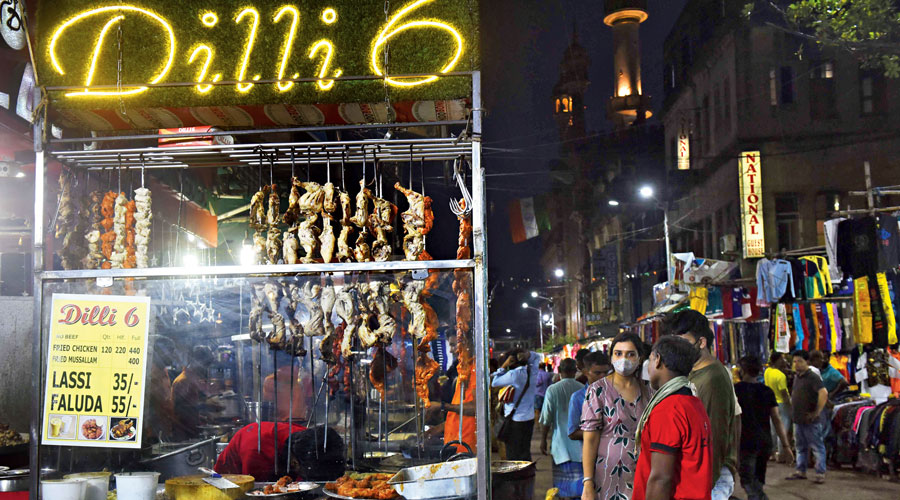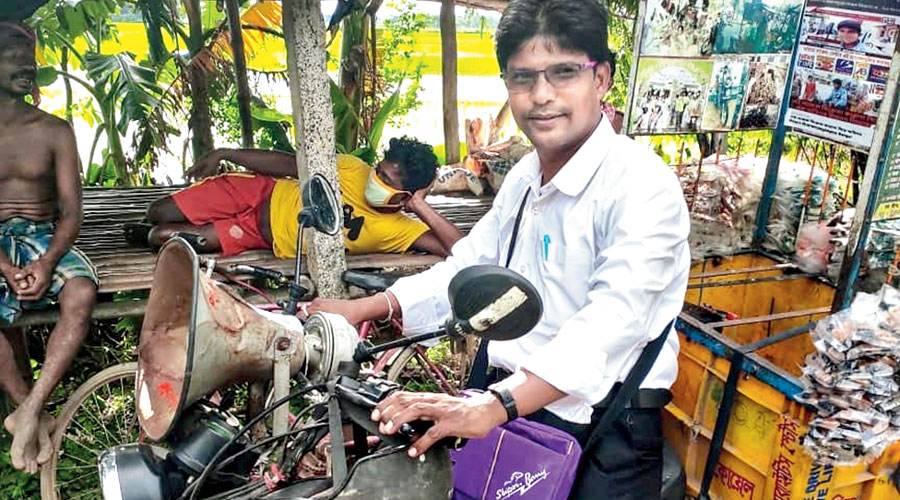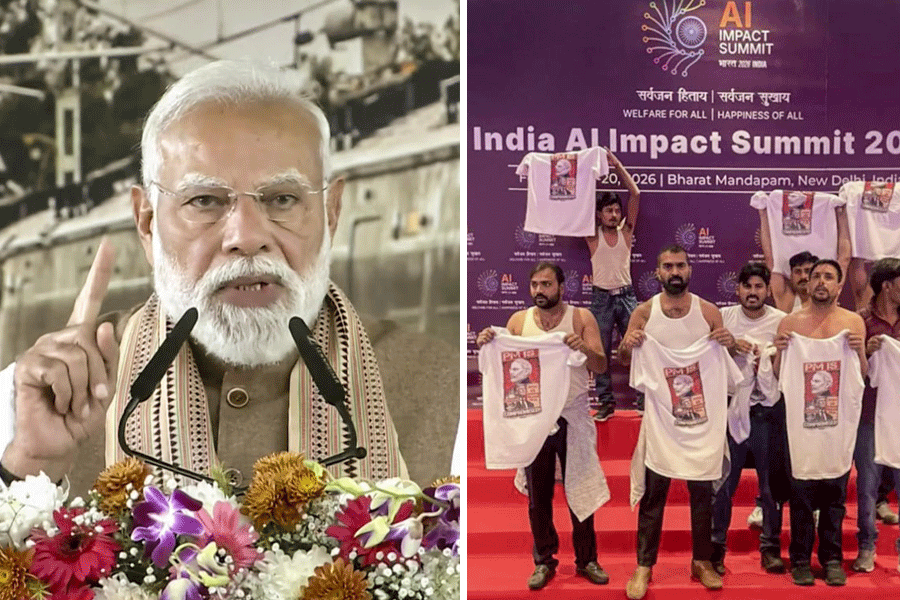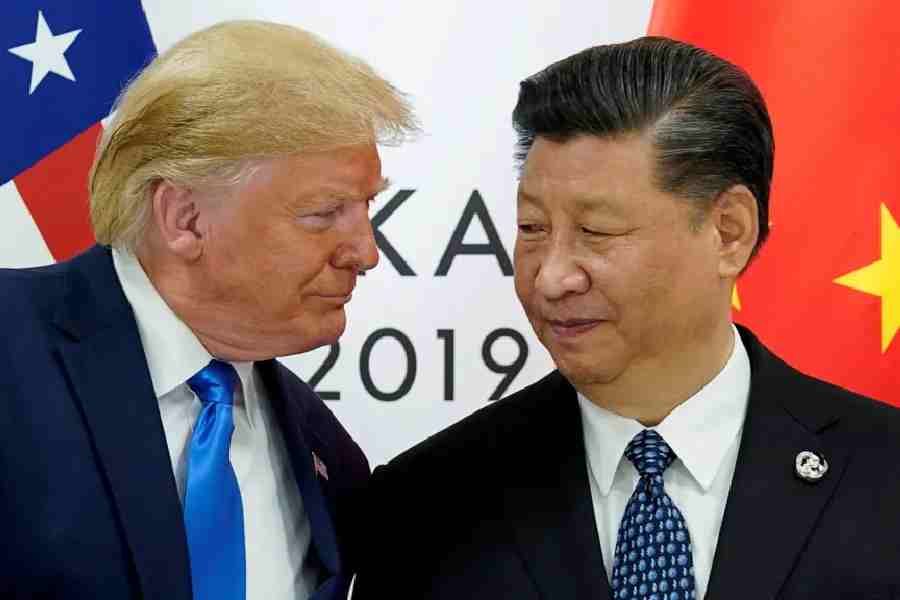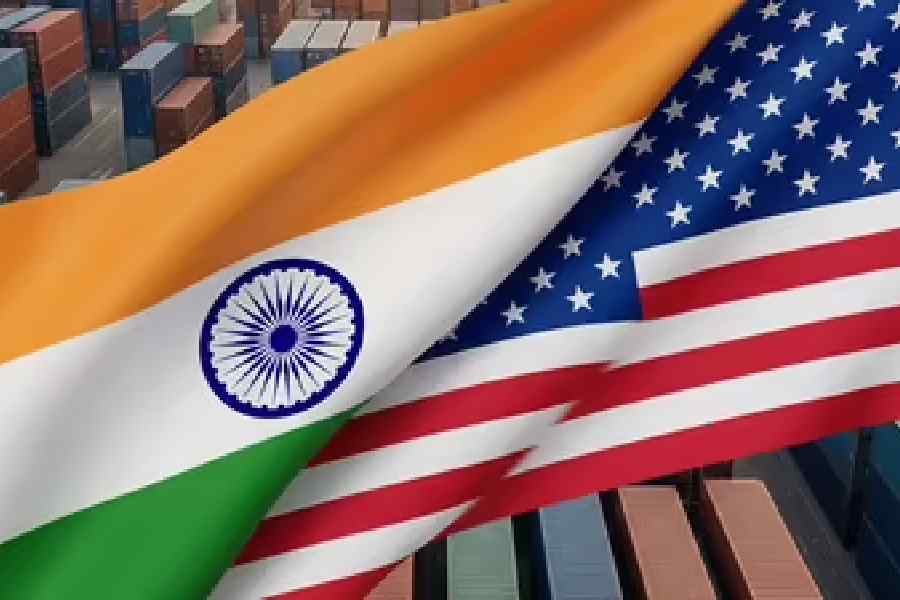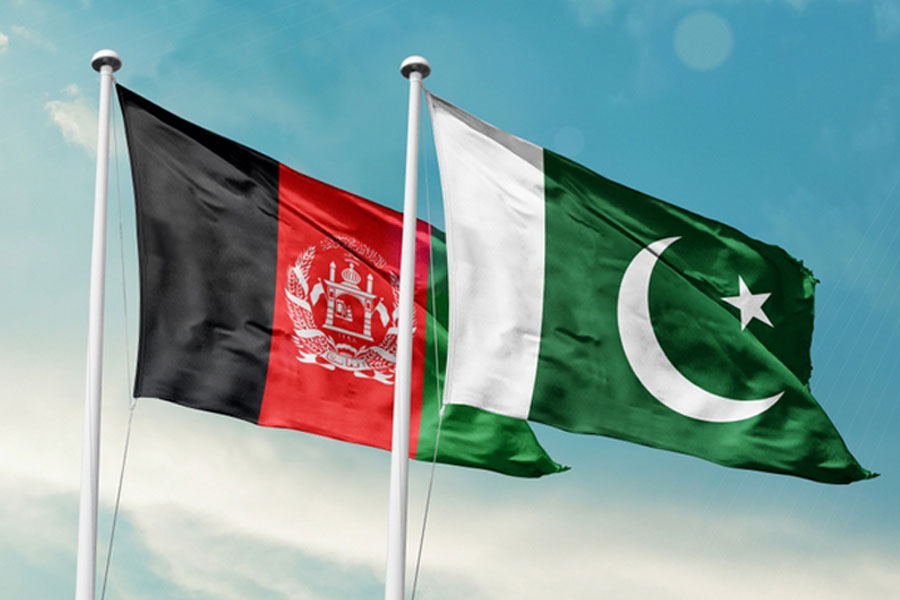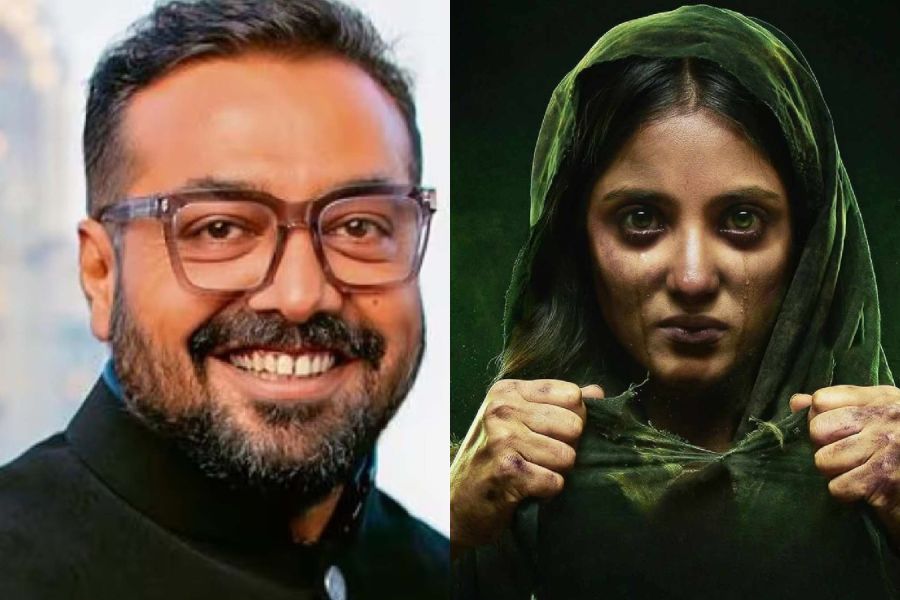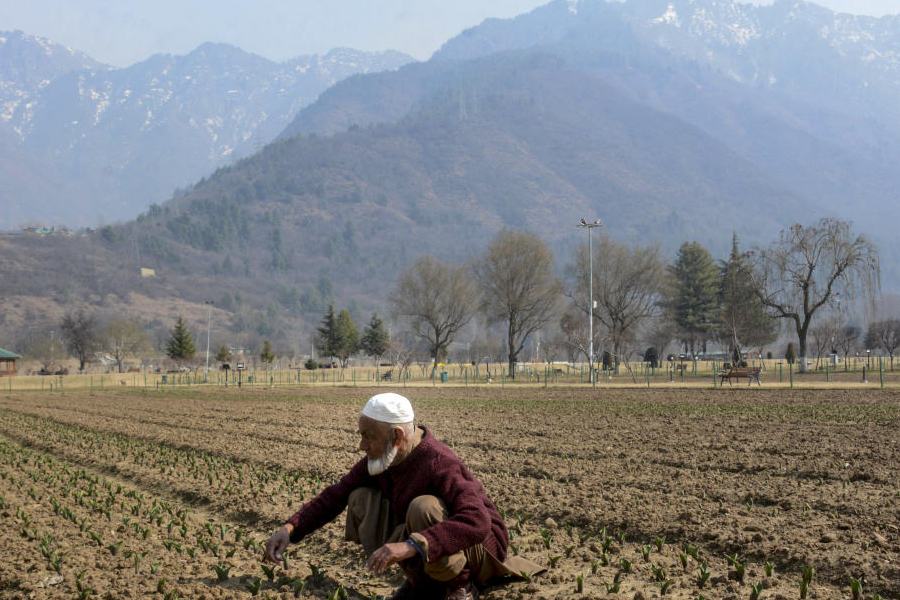Unable to manage the Ramazan rush, a small eatery on Zakaria Street started noting down the names of customers waiting for kebabs, fries and desserts a few years ago.
“The process confirmed what we always felt — that over 70 per cent of our customers were Bengali Hindus,” said Muhammad Mahmood, son of the owner of Dilli 6, one of the many joints selling Ramazan delicacies on Zakaria Street.
In election season, Mahmood -- and many others in the neighbourhood -- are banking on that very segment, Bengali Hindus, to halt the BJP’s marauding Hindutva juggernaut in Bengal.
“I have grown up here. Trust in the Hindu brethren of Bengal has been a part of our upbringing. The Hindutva politics will not work here,” Mahmood said with an air of confidence.
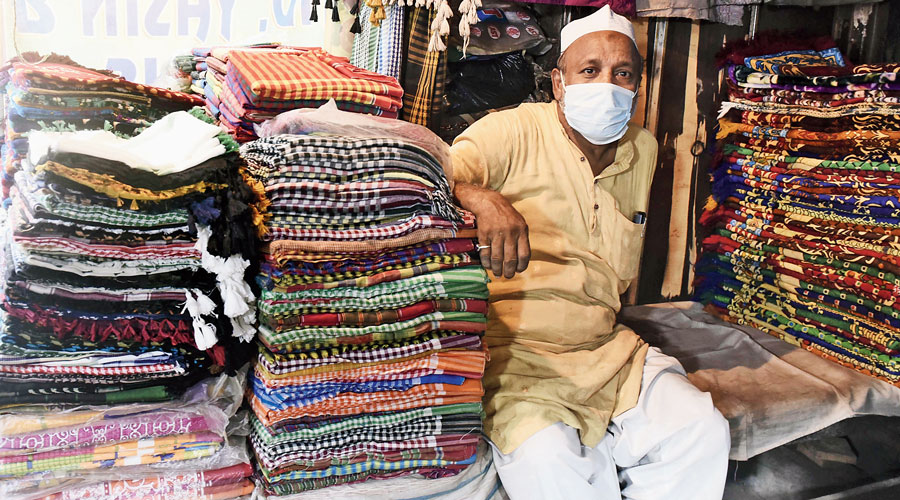
Muhammad Mustaq, who sells mats and gamchhas in a small makeshift stall on the pavement. Sanat Kumar Sinha
A 10-minute walk from Lalbazar through Rabindra Sarani leads to Zakaria Street, where the imposing Nakhoda Mosque overlooks scores of shops on both sides of the road. While the road might seem an extension of the Canning Street and Rabindra Sarani markets for the rest of the year, the run-up to Id is different.
From Ramazan till Id, Zakaria Street is the place to go for tens of thousands of Calcuttans. Stalls dotting the road sell everything — haleem, kebabs, sewai, bakarkhani (a type of bun), sheermal (a type of sweet bread), dry fruits, attar, kurta-pyjamas, abayas and skullcaps. The stretch used also to serve as the venue for many heritage walks until the arrival of the virus.
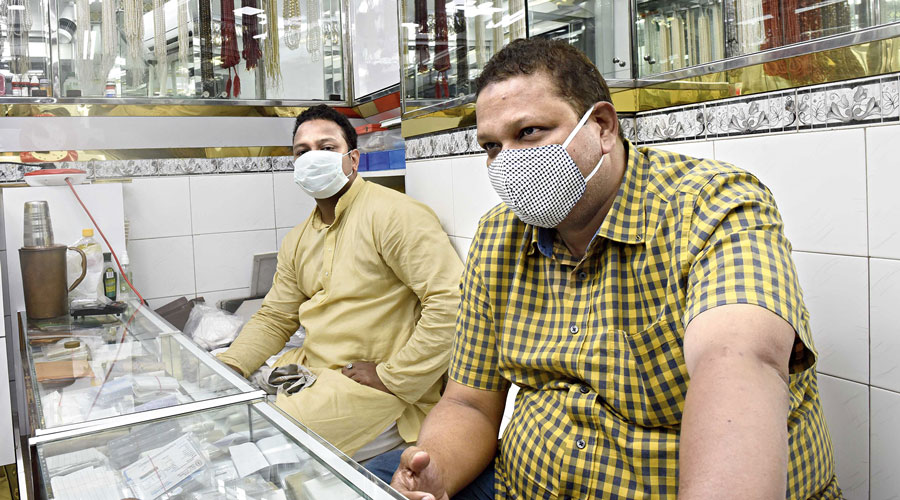
Brothers Muhammed Samir and Muhammed Tahsin, who trade in stones. Sanat Kumar Sinha
This year, in the middle of the elections, a sense of insecurity, agony and rage is palpable in the same air that smells of fritters, fried meat and falooda.
The insecurity stems from the prospect of a Right-wing regime in Bengal. The agony is rooted in a feeling of being “second-class citizens”.
“I don’t feel scared in Zakaria Street. But I feel scared when I watch TV news channels. The anchors call us names every day. Political leaders keep calling us termites and traitors,” said Muhammad Mustaq, 63, who sells mats and gamchhas in a small makeshift stall on the pavement.
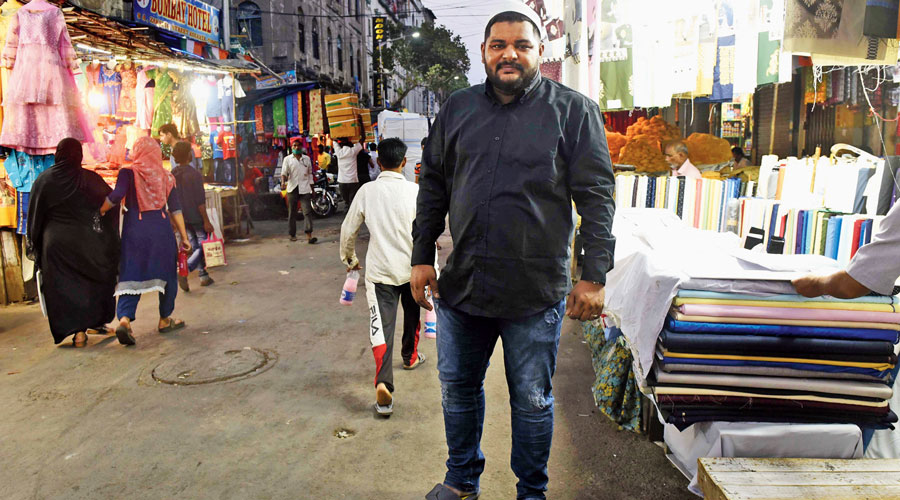
Ahmed Hasan, a Zakaria Street resident who owns Bashir Hotel at neighbouring Colootola Street, famous for its haleem. Sanat Kumar Sinha
The rage is directed against “political leaders who come from Delhi on chartered flights and speak of hatred and polarisation every day” and hyper-nationalist TV anchors.
However, a walk through Zakaria Street suggests an overarching belief in the secular fabric of Bengal, overshadowing all other emotions.
Muhammed Samir and Muhammed Tahsin, brothers who trade in stones, own a small shop on the road. Bengali astrologers form the bulk of their clientele.
“If a Hindu customer drops in during iftar, he joins us in sharing the meal. This is not new. Our father did the same thing during his time. We have been raised in this tradition of inclusiveness. During my youth, I used to go pandal-hopping every Durga Puja,” said Samir, 47.
The younger brother, Tahsin, 37, said that “Jai Sri Ram” sounded more like a war cry than a slogan. “People are being beaten up for refusing to chant the slogan. This is madness,” he said.
Food blogger Indrajit Lahiri has been visiting Zakaria Street during Ramazan for years now.
“Bengali Hindus have been visiting Zakaria Street and its neighbourhood for ages for Ramzan-specific street food. But with the emergence of social media, Zakaria Street has become a status symbol. In a way, it’s a natural progression and an extension of the inclusive character of our land,” he said.
Zakaria Street falls under the Jorasanko Assembly constituency, which votes in the last phase on April 29. Hindi-speaking traders, a segment the BJP likes to believe is its “vote bank”, form a sizeable bloc in the constituency. The street is a 10-minute walk from the BJP’s state headquarters in Murlidhar Sen Lane.
In 2016, Smita Bakshi of the Trinamul Congress won Jorasanko, bagging around 45,000 votes, or approximately 43 per cent of the pie. The BJP’s Rahul Sinha came second, winning a little over 38,000 votes, which translated into a 37 per cent vote share.
Jorasanko is part of the Kolkata North constituency, which Sudip Bandyopadhyay of Trinamul won in 2019. But the BJP candidate, Sinha, led from the Jorasanko Assembly segment. He bagged over 51,000 votes compared with Bandyopadhyay’s 47,000.
This time the contest is between the BJP’s Mina Devi Purohit, Trinamul’s Vivek Gupta and the Congress’s Ajmal Khan, the Sanjukta Morcha candidate.
Muslims form the majority in only a few of the dozen-odd wards that make up the Jorasanko Assembly seat. Before 2011, they swore allegiance to the CPM. But since the change of guard in 2011, they have been firmly behind Mamata Banerjee.
“We will finish sehri (an early morning meal before the Ramazan fast begins) and head towards the polling booths. We must vote and vote wisely, even at the cost of being shot at. This is not Sitalkuchi but we are ready to go to any extent to exercise our franchise,” said Ahmed Hasan, a resident who owns Bashir Hotel at neighbouring Colootola Street, famous for its haleem.
Some people this newspaper interacted with slammed Indian Secular Front chief and Furfura Sharif cleric Abbas Siddiqui. “The ISF is a front to split minority votes to help the BJP,” said Irfan Ali, a local Trinamul leader.
The anti-BJP sentiment in Zakaria Street and neighbouring areas has been fuelled by the Narendra Modi regime’s citizenship matrix.
From January to March 2020, the street was the centre of a demonstration against the Citizenship Amendment Act (CAA), National Population Register (NPR) and the National Register of Citizens (NRC).
Women — homemakers, political activists and students — were at the forefront of the sit-in in front of the Nakhoda Mosque. Many participants and speakers were Hindus.
“The graves of our forefathers in this land are proof of our citizenship. But if anything, our faith in Hindus was strengthened during the protests against the new citizenship laws. We know they have our back,” said Abdul Hameed, a 54-year-old resident.

